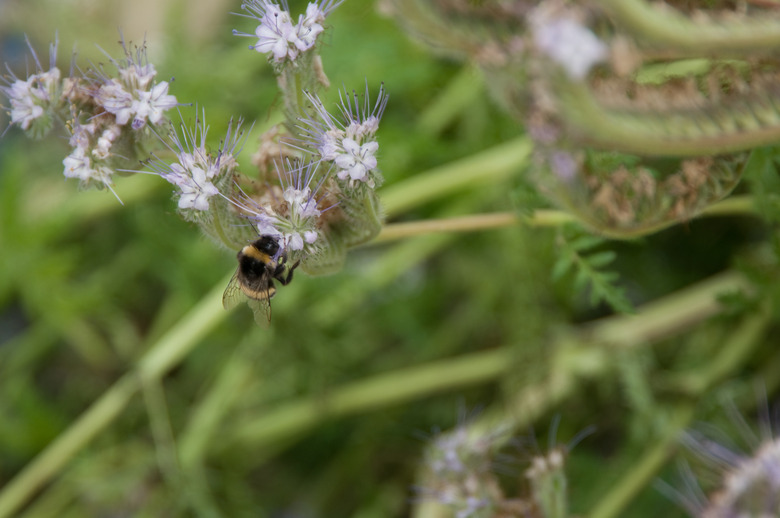What Are Bot Flies?
Bot flies are fly-like insects that, according to Ambergris Caye website, are stout-bodied, hairy and comparable in size to bumblebees. Their sole goal in life is to reproduce. A common way they do so is by laying their eggs on the hairs of horses. Additionally, bot flies are also capable of using humans as their host organisms.
Characteristics
Characteristics
According to Karen Griffith, bot flies have no other purpose in life but to lay eggs. Although it looks similar to a bee, it has no mouth and no stinger. However, in its lifespan, the adult female bot fly can lay between 100 and 300 eggs. Bot flies commonly lay their eggs on the hairs of horses for reproduction. They're also known to lay their eggs on mosquitoes, which can then inject the egg into a host organism that it bites. In this case, the larva develop inside the host organism.
Bot Flies on Horses
Bot Flies on Horses
Bot fly eggs appear as tiny tan specs and can be found on the horse's legs, flanks, shoulders, mane and chin. Where these eggs truly inflict their harm on the animal, however, is when the horse licks the egg-covered areas. The enzymes in horse saliva provide the enzymes to release the larvae, which are stored in the horses mouth, according to Karen Griffith. During the larvae growth stage, they are swallowed and attach to the horse's stomach lining, which can lead to ulceration, inflammation or even stomach ruptures.
"Human" Bot Flies
"Human" Bot Flies
Bot flies are also known to lay their eggs on mosquitoes, which inject the egg into its host as it feeds. Although rare, bot flies have infected humans in parts of Central America. For example, according to the Vexman website, a man was infested after being bitten in the groin area by a mosquito in 2000 in Costa Rica. The larvae form as maggots over a six-week period in the host. Infestation is characterized by a small hole, or warble, that the bot fly uses to breathe as it is developing. This can be very painful, as the maggots will occasionally squirm as they are developing.
Treatment
Treatment
In the case of a human infestation, the best way to treat the problem is to cut off its air supply. According to Vexman, this can be done several ways. One way is to use sap from a matatorsalo tree, which kills the larvae, leaving you to remove its corpse. Another way is to apply a raw, soft piece of meat on top of its air hole. Because it must breathe, it will burrow up into the meat. A third way is to apply glue to the hole and snuff the larvae. The maggot corpses can then be squeezed out the next day. According to the site, pulling out the maggot could cause it to burst in half, leaving part of it inside of you. Applying petroleum jelly to the air hole also helps drive them out, states Ambergris Caye. In terms of treating bot fly eggs on horses, it's important to brush, comb or hose them off as soon as you see them. Putting the horse on effective worming-prevention medicine can also help prevent the larvae from infecting the animal's stomach.
Cite This Article
MLA
Cornell, Scott. "What Are Bot Flies?" sciencing.com, https://www.sciencing.com/what-are-bot-flies-12570002/. 21 July 2017.
APA
Cornell, Scott. (2017, July 21). What Are Bot Flies?. sciencing.com. Retrieved from https://www.sciencing.com/what-are-bot-flies-12570002/
Chicago
Cornell, Scott. What Are Bot Flies? last modified March 24, 2022. https://www.sciencing.com/what-are-bot-flies-12570002/
